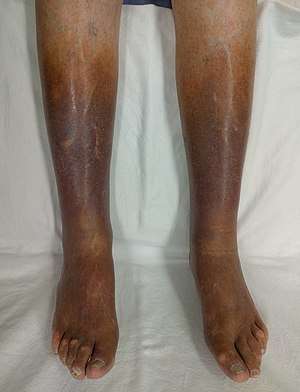Venous stasis
Venostasis, or venous stasis, is a condition of slow blood flow in the veins, usually of the legs.
| Venous stasis | |
|---|---|
| Other names | Venostasis |
 | |
| Skin changes as a result of long term venous stasis | |
Causes
Causes of venous stasis include:
- Chronic venous insufficiency.[1]
- Congestive heart failure.[2]
- Long periods of immobility that can be encountered from driving,[3] flying, bed rest/hospitalization, or having an orthopedic cast. Recommendations by clinicians to reduce venous stasis and DVT/PE often encourage increasing walking, calf exercises, and intermittent pneumatic compression when possible.[4][5][6]
Complications
Potential complications of venous stasis are:
- Venous ulcers
- Blood clot formation in veins (venous thrombosis), as with the deep veins of the legs (deep vein thrombosis or DVT), potentially indicating thrombosis prophylaxis.[7]
gollark: The one installed in my base.
gollark: Oh, right. It's a web-ish version of my random music player thing.
gollark: Apart from being totally lacking in styling, having issues if the network latency is too high, and working badly if there's not enough available metadata.
gollark: I made a programming project and it actually mostly works!
gollark: So did it randomly break again?
See also
References
- "Chronic Venous Insufficiency (CVI)". Cleveland Clinic. Last reviewed by a Cleveland Clinic medical professional on 05/14/2019.
- Zhu, Ruiqi; Hu, Yu; Tang, Liang (2017). "Reduced cardiac function and risk of venous thromboembolism in Asian countries". Thrombosis Journal. 15 (1). doi:10.1186/s12959-017-0135-3. ISSN 1477-9560.
- Barbara G. Wells; Joseph T. DiPiro; Terry L. Schwinghammer; Gary R. Matzke; Gary C. Yee; Robert L. Talbert; L. Michael Posey (2008). Pharmacotherapy Handbook. McGraw-Hill Professional. p. 163. ISBN 9780071485012.
- "New DVT guidelines: no evidence to support "economy class syndrome"; oral contraceptives, sitting in a window seat, advanced age, and pregnancy increase DVT risk in long-distance travelers". American College of Chest Physicians. 7 February 2012. Retrieved 10 February 2012.
- Hecht, M. E. (2010). A practical guide to hip surgery: from pre-op to recovery. Sunrise River Press. ISBN 978-1-934716-12-0.CS1 maint: ref=harv (link)
- Gould MK, Garcia DA, Wren SM, et al. (2012). "Prevention of VTE in nonorthopedic surgical patients: antithrombotic therapy and prevention of thrombosis, 9th ed: American College of Chest Physicians evidence-based clinical practice guidelines". Chest. 141 (suppl 2): e227S–e277S. doi:10.1378/chest.11-2297. PMC 3278061. PMID 22315263.
- Martinelli I, Bucciarelli P, Mannucci PM (2010). "Thrombotic risk factors: basic pathophysiology". Crit Care Med. 38 (2 Suppl): S3-9. doi:10.1097/CCM.0b013e3181c9cbd9. PMID 20083911.
This article is issued from Wikipedia. The text is licensed under Creative Commons - Attribution - Sharealike. Additional terms may apply for the media files.